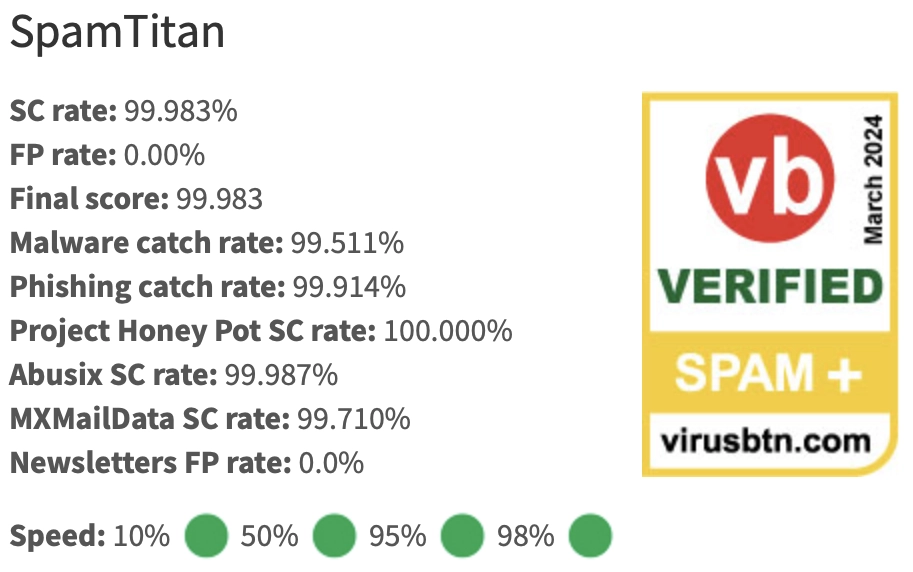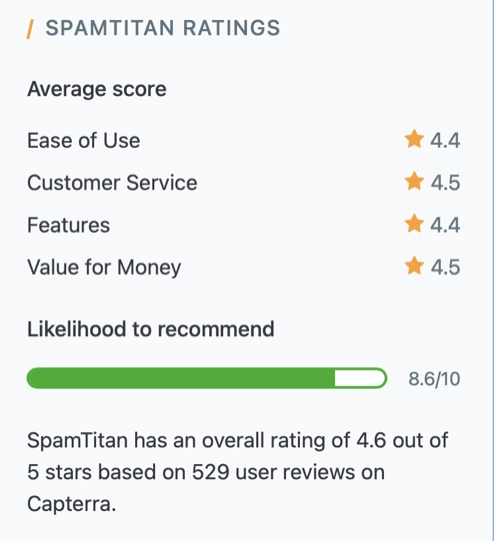Hosted spam filtering services offer many businesses a convenient and cost-effective way to combat the tsunami of spam. Spam filters prevent spam, phishing, and spoofed emails from initiating email-driven cyberattacks.
A hosted spam filter is a filtering solution that is a software-as-a-service (SaaS) cloud-based service. As a cloud-based service, a hosted spam filter does not incur capital expense. Cloud-based, hosted spam filtering is highly scalable and can be managed from any Internet-connected device. Managed Service Providers (MSPs) are uniquely positioned to host and deliver cloud-based spam filters.
An MSP or other host uses software to centralize a hosted spam filter's deployment, update, and maintenance. Centralized management of a hosted spam filtering service saves on-site visit disruption and reduces the downtime needed to update virtual and physical appliances. It also helps improve the effectiveness and timeliness of identifying and quarantining the latest web-borne threats.
Why you need a hosted spam filtering solution
Spam has many hidden costs. From impact on productivity to malware infection, spam can be financially damaging and can even affect company morale:
Productivity impact of spam
The average daily drop of emails into an employee's inbox is estimated at 121. However, if almost half of these are spam, the employee must wade through this sea of emails to find legitimate communications. Checking emails takes time. Estimates find that employees take around 2 hours each day to check emails. A survey from Slack found that 57% of respondents feel "bogged down at work" because of menial tasks, the top one being filtering irrelevant emails.
The financial cost of spam
Productivity impact alone costs the industry billions of dollars each year. Spending hours a day wading through irrelevant emails adds up. For an organization employing 1,000 staff, if each has to spend even one-hour checking emails that turn out to be spam, this adds up to 1000 hours across the business, lost daily dealing with spam.
Cyber harms, cyber-costs, and spam
Spam is not always just unwanted emails; spam can also be used as an attack vector, bringing malware into the business and causing other harm. Malicious spam, or "malspam," is used to deliver malware into the heart of a business via an employee's inbox. Malspam can deliver malware, such as ransomware. According to an IBM report, the average cost of a ransomware infection is $4.54 million. Spam causes other cyber-attacks, too. Business Email Compromise (BEC) depends on sophisticated manipulation tactics, including social engineering. Spam emails are used to connect with targeted individuals to build up relationships and find out information to help develop the BEC attack. A BEC scam cost, on average, $135,000 in 2023, according to the FBI's Internet Crime Complaint Center (IC3).
How hosted spam filtering service works
Hosted spam filtering services work in the same way as virtual and physical appliances used to filter spam. The hosted filter inspects Inbound emails against lists of senders and their IP addresses to identify those known to have originated from untrustworthy sources - blocklists. A hosted spam filter also uses multi-layered security mechanisms to check for breaches of sender policies to identify phishing and spoofed emails.
Any emails rejected by the filter are quarantined - as are any emails with infected attachments or links to compromised websites by antivirus software. Some advanced hosted spam filters check that outbound emails do not contain spam or viruses to prevent the organization's outgoing email servers from being blocklisted by global blocklisting services.
Did You Know?
99.99%
SpamTitan's spam catch rate
11 Seconds
a ransomware attack occurs
$285
the average cost to manage spam per person without an email filter
56.50%
of all email is spam
The primary distinctions between a hosted spam filter and other email filtering solutions are that the security mechanisms are always up-to-date, and the service's cloud-based hosting makes it simple to implement and manage. Organizations must adjust their mail exchanger (MX) records to redirect inbound and outbound traffic to the service provider's email servers and then manage the solution via a web-based portal.
How does an advanced hosted spam filtering service work?
Conventional spam filtering services use limited technology to detect spam. This problem arises as cybercriminals continue to improve their methods of evading detection.
For example, spam-containing malware may use techniques like polymorphism and encryption to evade detection. These evasion tactics work by continuously changing the malware's code signature. Hackers also use encryption to obfuscate the malware, making it difficult to detect. A mutation engine changes the signature using decryption routines. Conventional antivirus software used to detect malware carried in spam is useless against these advanced hacking tactics.
An advanced anti-spam filtering service, like SpamTitan, uses intelligent technologies to counteract the evasive tactics of modern spam. These technologies are also used to detect emerging patterns and signals of spam and identify complex cyber-attacks like Business Email Compromise (BEC).
The technologies used by an advanced hosted spam filtering service include the following:
AI-powered spam filter: A vast threat corpus of data is used to train AI algorithms to detect emerging threats and identify analogous behavior patterns.
Natural Language Processing (NLP): Multi-part or sophisticated scams like BEC use social engineering to trick employees. NLP is an intelligent technology that spots unusual language use and correlates communications between emails to identify anomalous behavior and social engineering. It detects Business Email Compromise (BEC), Vendor Email Compromise (VEC), and spear phishing.
Real-time threat analysis of URLs: Spam emails may contain URLs that take an employee to a spoof site where credentials or other data are stolen. AI-based anti-spam filters check email URLs by following the URL to the associated website to check their legitimacy. If the website is legitimate, the email is released to the employee.
Time of click protection: URL rewriting is performed in real-time. If the website the link goes to is malicious, the user will be prevented from opening the site.
Inbound and outbound filters: Spam can be an outbound and inbound security problem. Outbound spam can negatively impact an organization; the company's domain will be quickly identified as spam and blocked. Advanced spam filters, like SpamTitan, enforce inbound and outbound email protection. Also, some advanced systems apply Data Loss Prevention (DLP) to ensure that sensitive information does not leave the corporate network.
Evaluating the best-hosted spam filtering service
There are many cloud-based spam filtering services, and evaluating these services should ensure that the solution meets specific criteria. For example, does the spam filter use multiple layers of detection technologies, including AI? Some of these spam filtering services will be better than others at identifying and quarantining spam emails. In contrast, others will have more efficient front-line tests, such as recipient verification, to prevent backlogging. When evaluating the best hosted spam filter, organizations should ask service providers the following questions:
- Can the advertised levels of spam detection be verified?
- Will the filter reduce the load on my email server?
- Is there a choice of options for what happens to the spam emails?
- What anti-virus software is used by the hosted spam filter?
- What front-line tests does the filter conduct?
- Is there more than one cloud-based hosting option?
- What are your spam catch rates and your false positive results?
Ultimately, the best-hosted spam filter will be decided by an organization´s individual needs. For example, smaller organizations with limited IT resources may choose a hosted spam filter delivered by an MSP. Cloud-based spam filers delivered by an MSP are cost-effective and reduce the burden on internal IT teams. A cloud-based email filter solution requires no upfront software or hardware investment.
SpamTitan – an advanced spam filtering solution for business
SpamTitan is an advanced spam filtering solution for businesses that has AI technology at its core. Using multiple layers of intelligent technologies and techniques, SpamTitan detects all forms of spam, including malspam.
Leading testing and certification authority VB Bulletin has tested SpamTitan. The results can be seen below:

SpamTitan spam catch rate is an exceptional 99.98% and a 0% false positives rate.
SpamTitan is hosted in the cloud, where emails are filtered and checked for viruses and general malware, including ransomware. Organizations can set threshold scores to determine if an email is classified as spam. An organization can even choose to have spam emails above a specific score tagged and delivered. This flexibility ensures a high degree of fine-tuning to a corporate email service, ensuring that the most dangerous emails are stopped, but others quarantined.
Hear from our customers
SpamTitan also uses a double antivirus protection mechanism to failsafe malware detection. SpamTitan uses the top-rated Bitdefender and Clam Antivirus solutions alongside front-line tests such as RBL (real-time Blackhole Lists), SPF (Sender Policy Framework), Recipient Verification, Greylisting, and SMTP Controls to prevent delays in the delivery of incoming emails. SpamTitan uses AI, including NLP (Natural Language Processing), to identify emerging threats and complex multi-part attacks such as Business Email Compromise (BEC).
SpamTitan also protects outbound emails using Data leak prevention (DLP) to ensure they do not leak sensitive corporate data. Outbound email scanning also helps protect your brand from being listed in blocklists.
SpamTitan Cloud can be hosted in TitanHQ’s cloud, delivered via an MSP, or, for large enterprises, hosted in a private cloud or within their own infrastructure.
What the market says about SpamTitan

Source: Capterra

Source: G2

Source: TrustRadius
Test the Advantages of SpamTitan Cloud - for Free
The best way to evaluate any spam filtering service is to test it in your own environment. To help you do this, TitanHQ invites you to test the advantages of a fully enabled SpamTitan-hosted spam filter for free for fourteen days. The offer comes with full technical and customer support, and you are not obligated to purchase a license once your trial period has ended.
Frequently Asked Questions (FAQs)
How does a hosted spam filter block malware?
A hosted spam filtering service blocks malware using layers of protection. This includes antivirus protection that detects malicious email attachments. Once detected, the suspicious emails are placed into a sandbox environment, where they can be safely opened and further investigation carried out. Email filters also use URL checks, including "point-of-click" URL analysis. This checks each embedded link when a user clicks on the link. The software navigates to the destination web page to check if it has been weaponized or is a phishing site. Advanced spam filters use AI technologies to check spam for social engineering and emerging threat signals.
Why should I pay for a professional spam filter when free options are available?
Paying for a professional spam filter when free options are available ensures you get the best protection for your business. Consumer-grade (free) solutions need advanced detection mechanisms to identify emerging and complex threats faced by businesses. For example, a professional spam filter will include capabilities such as data loss prevention (DLP), point-of-click URL analyses, and outbound scanning. It is also worth noting that studies show that only 14.3% of all emails are missing or caught by consumer-grade spam filters.
Is it possible to get email hosting with spam filtering?
Most email service providers, including Microsoft and Google, provide email hosting with spam filtering. While the standard of spam filtering has improved in recent years, many email threats bypass the spam filtering mechanisms of email service providers. Microsoft, for example, only includes essential protection as a standard. Users must pay extra for more advanced spam filtering mechanisms. For this reason, many businesses choose a third-party provider that can provide equivalent or better protection at a lower cost.
What alternatives are there to hosted spam filtering?
The alternatives to hosted spam filtering are on-premises software or on-premises hardware. On-premises software-based spam filters are generally better than hardware-based spam filters due to the lower management overhead (provided the software is patched and updated automatically by the software provider). There may also be substantial upfront costs when deploying a hardware-based spam filter.
Should I use a cloud spam filter service or an on-premises email filtering solution?
Choosing a cloud spam filter or an on-premises email filtering solution depends on your business requirements. Cloud spam filters and software-based spam filters offer an equivalent level of protection; however, the latter tend to be more customizable. On-premises solutions are often better in highly regulated industries and ideal for any business with reservations about cloud computing. Smaller companies with tight budgets and small IT teams can have an MSP deliver a top-of-the-range, cost-effective spam filter service.
Why are software updates in hosted spam filters beneficial for organizations?
Software updates via hosted spam filters benefit organizations by reducing the management overhead of updating the software. Also, anything goes wrong during an update. In that case, this will occur at the provider end rather than the organization – thus eliminating potential downtimes (during updates) and disruptions (if an update must be reversed).
How does spam impact productivity?
Surveys into email overload and distraction found that 46% of employees struggle to complete projects and activities on time. Employees also take more time to complete their work because of email overload. Worryingly, one study found that when email was removed, stress levels dropped. All these studies point to productivity issues when email is not controlled. By removing spam, an employee’s inbox becomes more manageable.
How does a hosted spam filter function?
A hosted spam filter functions by inspecting inbound emails against lists of blocklisted senders and IP addresses and identifying untrustworthy sources. The filter also employs multi-layered security mechanisms, including time-of-click URL analyses, AI, and NLP to detect phishing and spoofed emails. Emails detected as threats are rejected, quarantined, or forwarded to the recipient with a warning depending on how the filter’s policies have been configured.
What distinguishes a hosted spam filter from other email filtering solutions?
What distinguishes a hosted spam filter from other email filtering solutions is how it is deployed. Whereas an on-premises software, hardware, or virtual gateway solution has to be installed on the organization’s network, the deployment process for a hosted spam filter consists of redirecting the organization’s mail exchanger record—a process that takes less than a minute.
How do the filtering solutions treat spam emails and infected emails?
An organization can decide how the filtering solution treats spam and infected emails. While infected emails should be blocked, deleted, or quarantined by default, the option exists to relax spam confidence levels to permit the flagged delivery of spam-like emails in certain circumstances. Post-remediation can then take place, as determined by policies.
What considerations should organizations bear in mind when evaluating hosted spam filters?
When evaluating a hosted spam filtering service, an organization should consider the spam detection rate, the false positive rate, compatibility with existing security mechanisms, ease of use and configuration, cost-effectiveness, and technical support. Specific company requirements may determine the most important criteria for choice. For example, a smaller organization may need to gain the internal skills to host its own spam filter. In this case, MSP delivery of a hosted spam filtering service would allow that company to have a best-in-class spam filter at a cost-effective price.


